Why I don't use PFF grades
Plus all the tools and websites that I do use to do what I do: Seaside Joe 1548
I want to share some of the Internet tools that I use everyday to help create Seaside Joe. It might help readers in their own daily football lives when curious about topics that Joe hasn’t covered, to share your own research in the comments section, and because maybe you’re just curious. Despite the usefulness of these sites, I rarely see them given their proper due from the media and that includes from me, so therefore here you go.
Pro-Football-Reference
A more accurate Wikipedia for football writers, not only because of how much knowledge it contains but also because it is completely free and yet also not overrun by advertisements. From their About page:
The Sports Reference sites first launched with Baseball-Reference.com in April 2000 by Sean Forman, Pro-Football-Reference.com in December of 2000 by Doug Drinen, and Basketball-Reference.com in April of 2004 by Justin Kubatko.
Sean Forman formed Sports Reference, Inc. in October of 2004, and in December of 2007 the three groups joined forces with Jay Virshbo to create Sports Reference LLC (based in Pennsylvania). We currently have 31 full-time employees.
Let’s just say that you’re curious about something related to the history of the Seattle Seahawks, whether it’s statistical or roster-related. There’s a good chance that information can be found at Pro-Football-Reference:
If you want to know how the defense finished in every season under Pete Carroll, that’s something you can read in one second of your eyes moving around the page:
In a click or two, you can find Seattle’s entire head-to-head history against every organization, every draft pick ever made by the Seahawks, statistical leaders of all kinds, and the stats for every game and every season in the history of the team. You can even find every play in every game going back as far as 1994.
In my last 13 years of being an NFL writer, I’ve probably spent 10% of my life on a Pro-Football-Reference page, as well as their College-Reference site. I can’t imagine how anybody would survive in this business without it and it’s remarkable that PFR doesn’t get near the credit or attention as sites like PFF, which in itself probably wouldn’t even exist without the former.
Why I don’t use PFF as a regular resource
By the way, I won’t be mentioning ProFootballFocus in my list of sites that I regularly use. Some would say that’s a mistake but as long as you agree that their grades carry no meaningful weight, then what value do they serve to a writer? Advanced stats vary from site-to-site (and you can find Advanced Stats on Pro-Football-Reference for completely free) and are readily available at places like PFR and Next Gen Stats without a paywall.
I’ll read a PFF article and in rare instances maybe even reference them, but I think the overreliance by other writers to treat their grades (especially for offensive linemen) as gospel is doing far more harm than good. It’s a lazy way to place a value judgment on a player as if it’s your own opinion and without having anything else to use as a cross-reference, including your own eyes.
If I was talking to a writer from PFF and he told me, “I watched a lot of tape on Charles Cross last season and my opinion is X, Y, and Z” then I would take that into account. But taking grades from anonymous sources (also known as interns) and then using that opinion as the end result for what you use to tell readers how they should feel about a player, that to me is unfair to the players, unfair to the team, unfair to other writers, and most of all unfair to your own readers.
If I’m doing research into a player like Damien Lewis for example and find “Okay, his PFF grade was great in 2021 but bad in 2022,” all that does for me is start a journey of more digging and further reasons to explain if that is reasonable or if it is not. But to take a player’s grade—which is nothing more than a numerical representation of some random person’s opinion—is exactly the same as if I told you, “Well, I think Geno Smith is a good quarterback because literally one person (who I don’t know) told me that’s what I’m supposed to believe.”
Nobody does that, right? Take ownership of your opinions, don’t source them out to a clickfarm just because it’s harder to evaluate some players than others.
Stat-Head
Though Pro-Football-Reference is free, what I do pay for each month is access to their play index finder tools at Stat-Head. The reason I don’t pay for PFF isn’t because they have a paywall—paywalls are generally GOOD—and I am happy to subscribe to tools that provide a valuable service such as the ones at Pro-Football-Reference and the other reference sites.
With these tools, I can find stats and historical data, including combine results going back to 2000, trades going back to 1994, and draft picks going back to 1936, with just a few clicks.
I don’t play video games. But I do play “Find out who every 36th overall pick in history has been” all the time.
Football Outsiders
Another site and tool that I pay for is Football Outsiders and their DVOA, DYAR metrics, although I don’t know how much longer I’ll still view them as a valuable resource.
DVOA: Defense-adjusted Value Over Average
DYAR: Defense-adjusted Yards Above Replacement
These are numbers that I’ve generally been a fan of for more than a decade but recently am less sure about their actual value in achieving a greater understanding of football.
Something I may find more valuable at FO would be things like Strength of Schedule, as that tells me more about a team’s actual strength of schedule than simply the win-loss record of their opponents.
But even though it’s a number, it’s important to keep in mind that a human came up with the formula, so DVOA and DYAR are still opinion-based. Though yards and touchdowns don’t do enough to explain the value or a player, play, or team, those stats do have one advantage: They can’t be manipulated by a person on the Internet: If you got a yard on the field, that’s your yard.
I mentioned Next Gen Stats earlier, which has some interesting numbers (Kenneth Walker had the second-fastest play of the 2022 season, while Tariq Woolen ranked 10th and Rashaad Penny was 15th) but my appearances on that site are still pretty sporadic.
OurLads Depth Charts
For depth charts and rosters, there’s no second place. Just use OurLads. Not only every roster and depth chart (estimated) in the league today, but archives going back to 2007.
OvertheCap, Salary Cap information
The great debate of salary cap websites comes down to OtC and Spotrac, and while I use the latter for some things, OvertheCap comprises about 98% of my time in contract and salary research.
It is with the help of OtC that I am able to usually come up with very accurate estimates of upcoming contracts.
Google/YouTube
For stuff like the Origin Story series, and billions of other types of stories, of course I couldn’t do as much without simple searches on Google and YouTube. The ability not only to search, but search within specific date ranges, makes research that much easier and more interesting.
And YouTube is probably the video streaming service that I use the most, even more than Netflix/HBO/Hulu/Amazon combined. I can’t believe that anyone is paying for Netflix but using the free and ad-dominated version of YouTube. Netflix is hanging on by a thread in my rotation right now.
I do use Twitter everyday too, but it’s becoming less and less common for me. Other than breaking news, and searching for specific things said in the distant past, that website has lost almost all value to me.
Any sites or tools that you think I should be using?

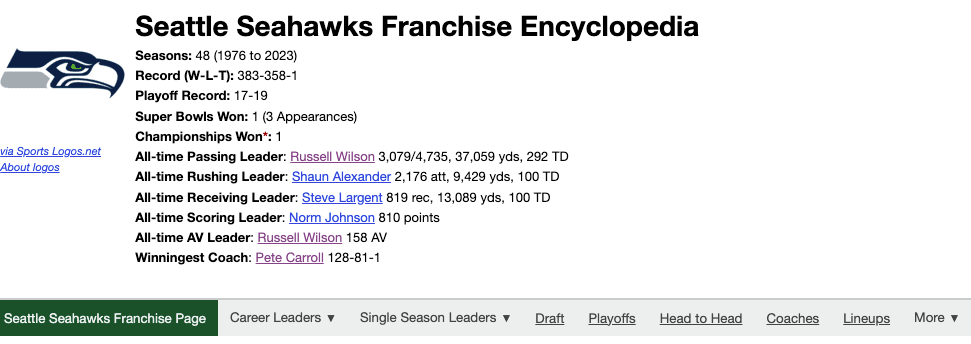
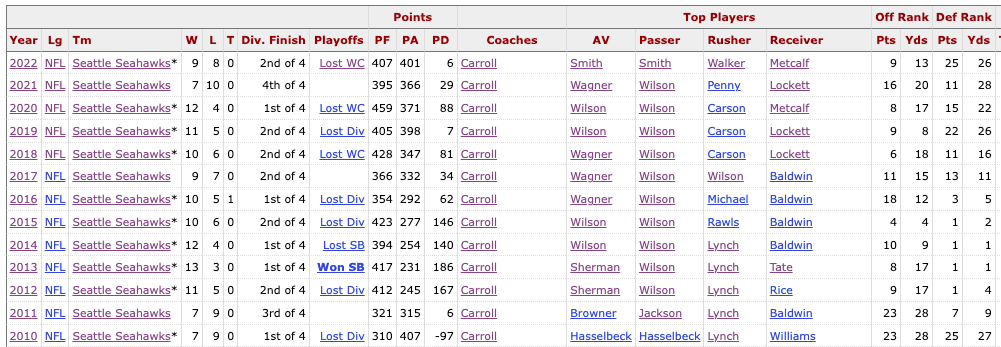
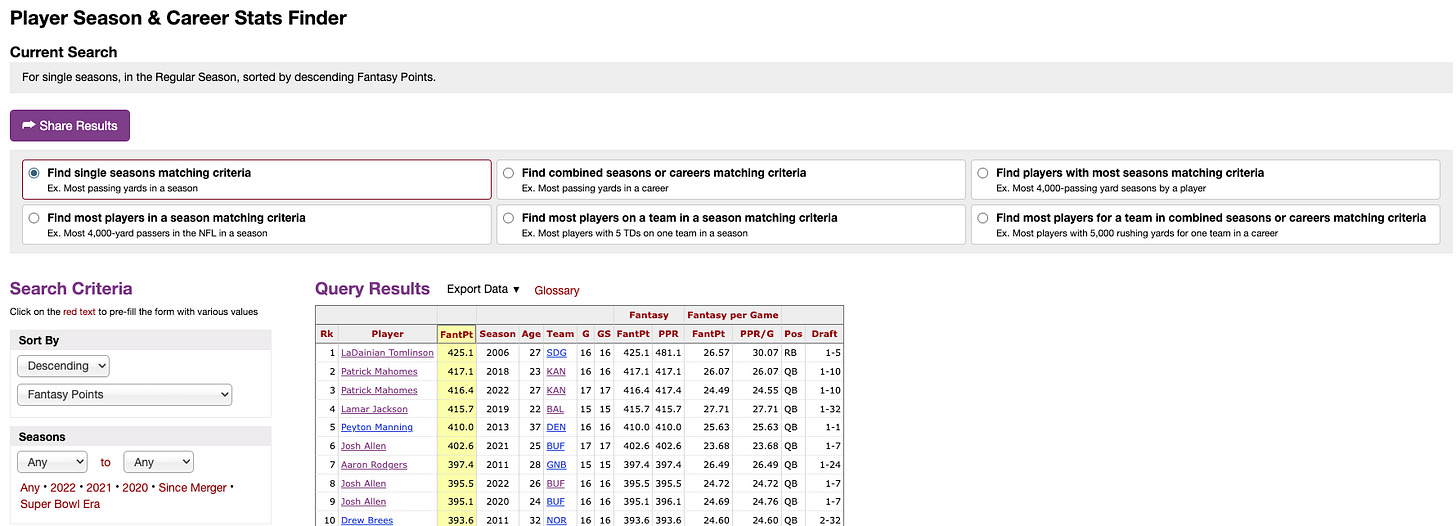
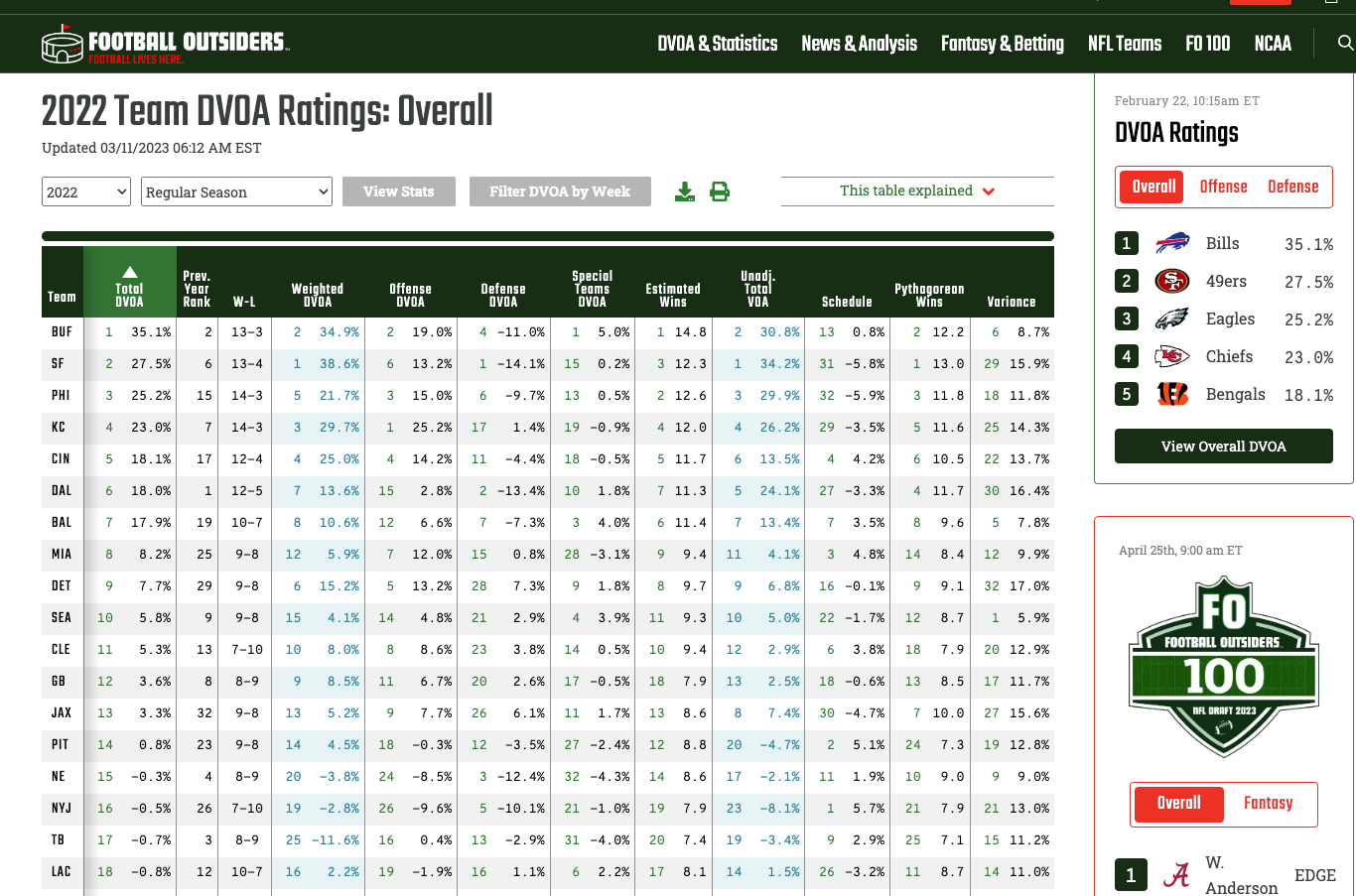

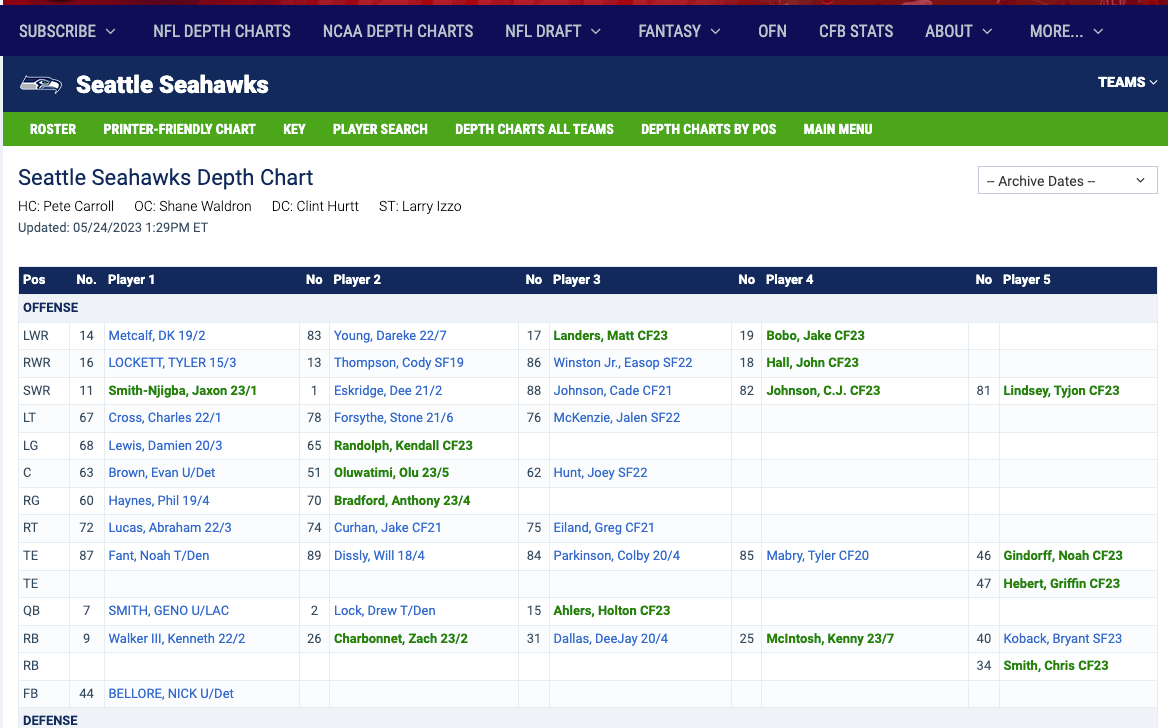
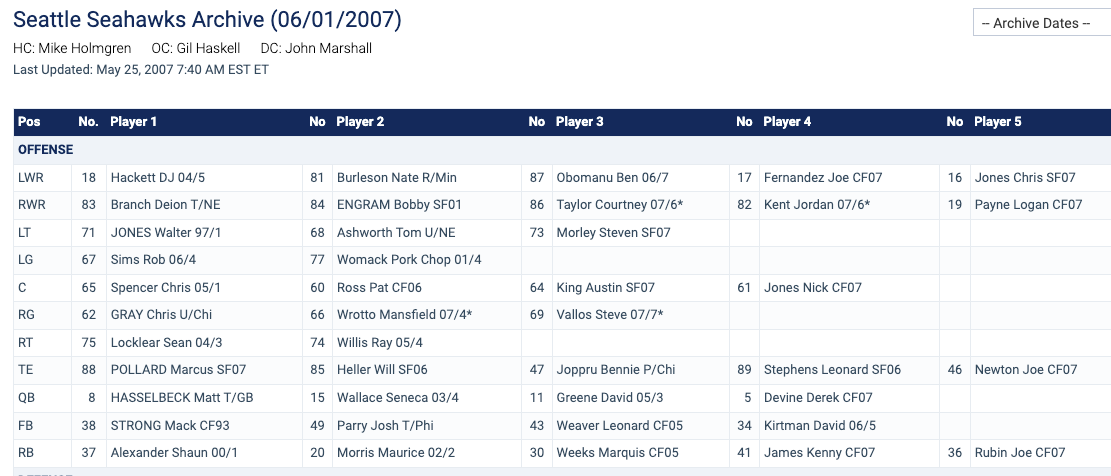
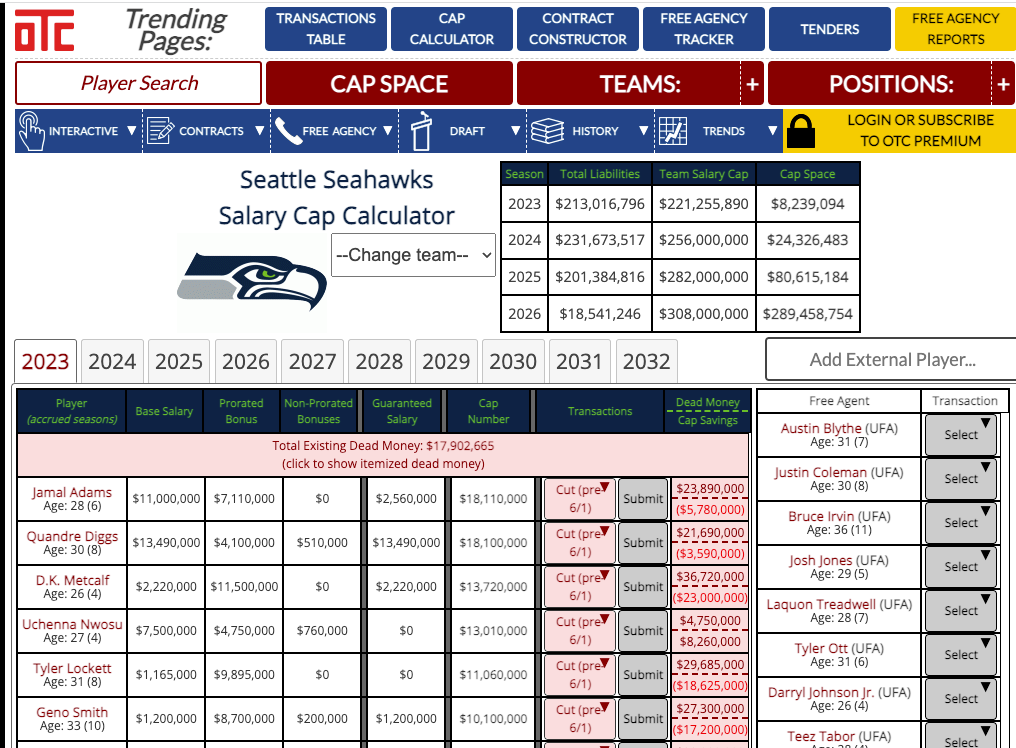
I don’t use any of those statistical/analytic sources. I’m just a Hawks fan who subscribes to SJ, in small part because I don’t want to delve into any of that. I trust (and pay) SJ to do a great job with that stuff. For me, the individual and group psychological factors - and human interest content - that affect team outcomes at every level is what would interest me - if I were to do any deeper dive than my SJ subscription.
Re PFF, Dave Wyman pointed out that even missed blocks are hard to assess if they don't know what the assignment is (which he doubts, since PFF would have to have access to playbooks). E.g., it might look like Damien Lewis missed a block, but that may have happened while he was trying to cover for another lineman's missed assignment.